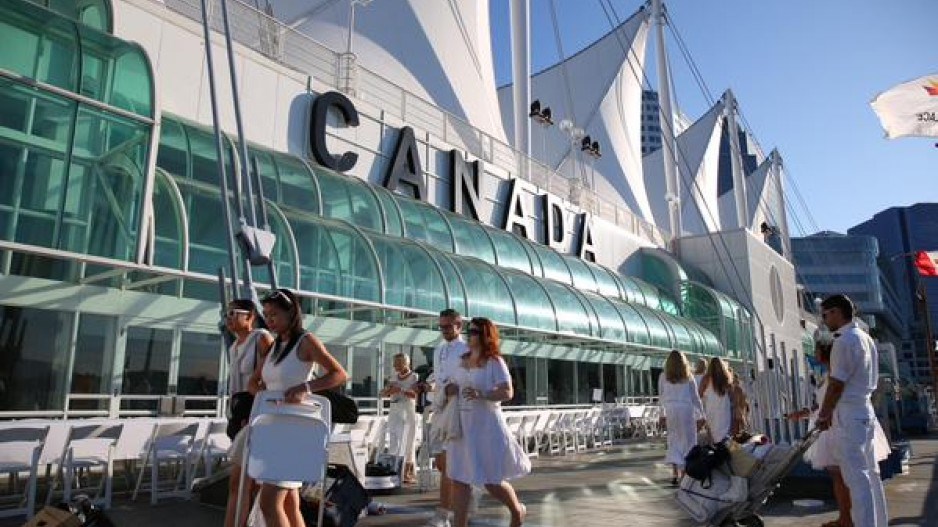It seems North Americans can’t get enough of dressing in white to picnic in a secret location.
As Diner en Blanc enters its fourth year in North America, the organization behind the event, Diner en Blanc International, is working to manage global demand while attempting to stay true to the event’s origins as a spontaneous Paris gathering of friends and friends-of-friends.
After co-founders Sandy Safi and Aymeric Pasquier brought the event to New York in 2011, “we started receiving requests from all over the world from people wanting to create their own Diner en Blanc,” Safi said.
Vancouver’s August 25 event is the fourth year for the gathering in this city. Last year’s event drew 3,500 people; this year 4,500 tickets quickly sold out when they went on sale in early August, according to the Diner en Blanc Facebook page. This year the event was held at Canada Place; in other years the partygoers have gathered at David Lam Park, Jack Poole Plaza and near Science World.
The organizers of Diner en Blanc Vancouver, Jordan Kallman and Tyson Villeneuve, declined to do an interview for this story.
Diner en Blanc International is based in Montreal and receives thousands of requests a year to bring Diner en Blanc to cities all over the world, Safi said. DEB International chooses organizers for local events based on their skills and capacity to host the event, then licenses the Diner en Blanc concept to them for free.
Diner en Blanc International has created a web platform for the event, which handles ticket sales and acts as a social media platform for partygoers; the organization also provides training to local hosts to keep the experience consistent in each city.
The local hosts take on the cost of organizing the event, which involves paying for security, lighting, sound, entertainment and liquor service. They then recoup their expenses through ticket and liquor sales; they are also permitted to have three corporate sponsors (this year’s Vancouver event is sponsored by Nordstrom, Concord Pacific and RBC). Tickets for the Vancouver event are $37. 
In the first couple of years, it's common for the event to either not cover its costs or just break even as it gets established in a city, Safi said.
An $8 membership fee and a ticket sale transaction fee goes back to Diner en Blanc International, which has grown to employ 10 full-time staff.
“Everything we do is reinvested into being able to provide the best infrastructure possible,” Safi said.
Diner en Blanc International tries to avoid a typical corporate sponsorship model, Safi said, instead partnering with companies that can give "a return to the guest when they attend the event." In the past, Diner en Blanc International has partnered with Air France, which gave free flights to guests to attend Diner en Blanc in Paris. This year Celebrity Cruises is giving a free cruise to the winners of a table decorating contest.
Safi said she didn't know the details of the Vancouver event's sponsorship agreement.
"We're cautious," Safi said of corporate sponsorships. "We don’t want to damage the brand."
Pasquier’s father, Francois Pasquier, started Diner en Blanc in Paris 27 years ago; Aymeric Pasquier started a similar dinner in Montreal in 2009, and he and Safi brought the event to New York in 2011.

Diner en Blanc Vancouver in 2014, when the event was held in David Lam Park | Cathy Browne, Flickr
“When the event started in Paris, basically [the authorities] turned a blind eye and it grew over 27 years to become an activity that just happened in the city,” Safi said, noting the number of people coming to the event increased slowly over two decades. The Paris event now draws 15,000 people.
It’s been a much different evolution in North America, where the first event typically starts with several thousand people coming to a public park, meaning the events must be properly permitted and abide by liquor regulations. With the exception of Quebec, most cities in North America don’t allow open liquor in public spaces. The party area is usually fenced off and liquor must be served by trained staff.
“There’s so much red tape when you want to do something like this,” Safi said.
“Kudos to the organizers of every city who manage to pull this off and find a comfort zone where the city’s comfortable and guests are comfortable — it really is a juggling act.”

@jenstden




